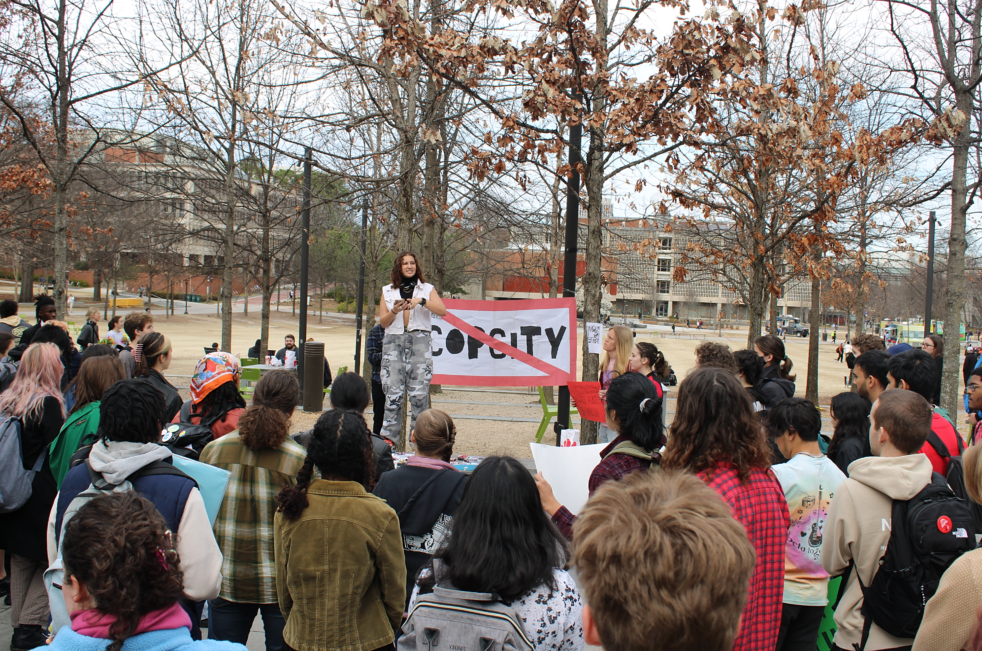Last Friday, a legion of students gathered at Tech Green, one of the Institute’s primary green spaces, to protest the construction of the Atlanta Public Safety Training Center — often referred to as “Cop City.”
The facility’s construction is resisted on many fronts, as opponents are concerned with its environmental and political implications. Many contend that creating a large training facility would not only damage the surrounding forest but would also magnify police brutality rates in the city — particularly following the death of environmental activist, Tortuguita, at the Center’s future site.
In addition to raising awareness about “Cop City,” the student protestors on Tech Green recognized and honored Tyre Nichols, a 29-year-old Memphis resident fatally assaulted by a group of police officers in January.
The demonstration was spearheaded by first-year ME major Samantha Bolton and the club that she founded earlier this school year, Tech’s Organization for Social Activism (OSA). According to their Instagram, “OSA’s purpose is to provide access to civil engagement and allow student input toward positive impact on social justice issues on and off campus.”
Students utilized the gathering to express their frustration with the city’s intended plans. When interviewed, they each shared a similar sentiment, agreeing that this was not the proper redevelopment residents of Atlanta desired.
“I feel like [building ‘Cop City’] is really going to harm the environment. The land that they are building on is known to be useful in times of drought, and they are now building fake houses on top of it to use for raids,” said Megan Woody, second-year BCHM.
First-year IE Annie Dang added on, saying that “it is the crossing of several different social movements going on right now, including climate, racial and housing justice. This issue is urgent and, if it is ultimately built, the establishment has numerous repercussions. Facilities like ‘Cop City’ could spread to other cities and exacerbate what is already going on.”
Alongside their wishes to prevent the development of the training facility, many Tech students shared their discomfort with the potential growth of policing in Atlanta.
“I wish that we could look into other ways to deal with crime because there are specific reasons why it happens. There are deeper explanations to why it is in low-income and Black communities, and there are funding, mental health and education programs we can implement to address this. So many different factors feed into this system of violence, and militarizing the police is not the answer,” Bolton said.
Similarly, Dang said that “the idea of an expanded police force is honestly scary. So much of Atlanta is underfunded and, rather than addressing that, they are constantly funneling money into further militarizing the police. The prospect of Atlanta entering what is essentially a militant state is frightening, especially for young people like myself who are living here and dealing with it.”
Alongside the crowd of students were a plethora of guest speakers, one of which was Kamau Franklin, a prominent social justice figure and the founder of Community Movement Builders.
He took to the stage to explain to Tech students what role they played in making a tangible change in their community.
“You as students are leaders of a struggle like this. You have to understand that a city like Atlanta does not want schools like Georgia Tech, Georgia State, Morehouse or Spelman out in the streets protesting and organizing against ‘Cop City’; in fact, they do not want you protesting against anything,” Franklin said. “When you start to lift up your voices and come out into the streets of your campus, you are scaring the city. It is not organizers like myself that terrify them; it is the power of students and young people.”
Franklin went on to reflect on past mechanisms used to push for mass social change.
“In the sixties and seventies, it was young people who were the heart of building militant movements. … You all need to connect with your fellow college students across Atlanta to build a movement that they have not seen before. It is only going to be through your power that a ‘Cop City’ stops from getting built.”
Following the speeches at Tech Green, students took to marching across the Tech campus. Many held signs saying things like “Policing the Police: Say No to Deforestation” and “Promote Peace, Challenge Police.” Moreover, while marching, they chanted phrases such as “export love, not war” and “no justice, no peace, no racist police.”
All in all, Bolton said that, “as much as [I] hope that it can stop ‘Cop City’ fully, the impact [I] really wanted this protest to have is galvanizing students. [I] hope for college students in Atlanta to get to a point where they are speaking up — not just whispering. People might be passionate but are unsure of what to do with their knowledge. This is our chance to bring those two things together and make active change.”
To learn more about OSA and their mission surrounding police reform, please refer to their Instagram, @osa_gt.
